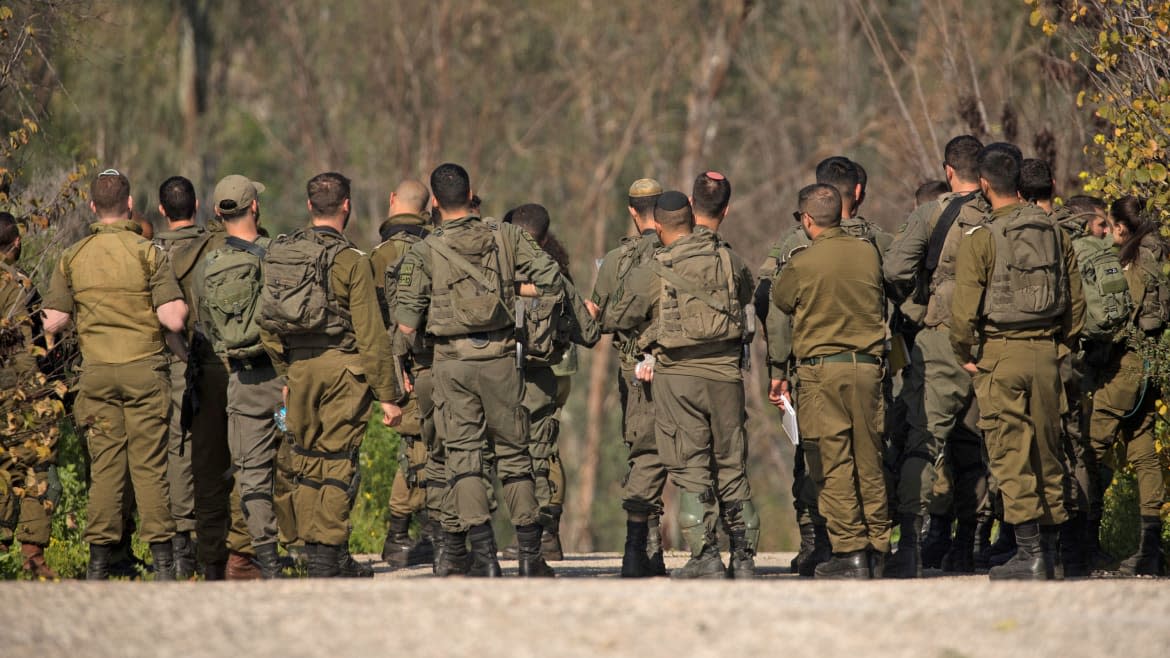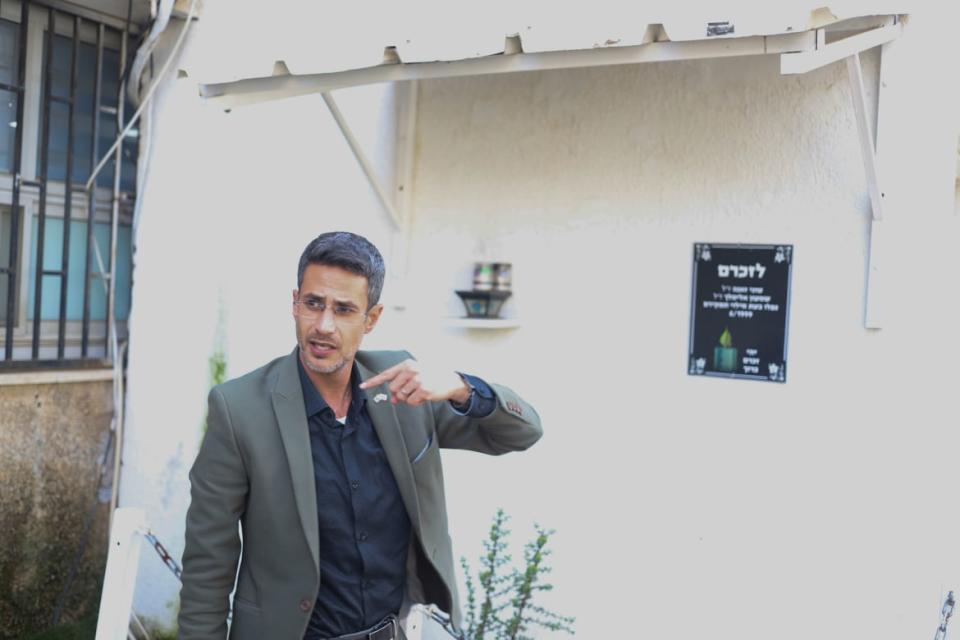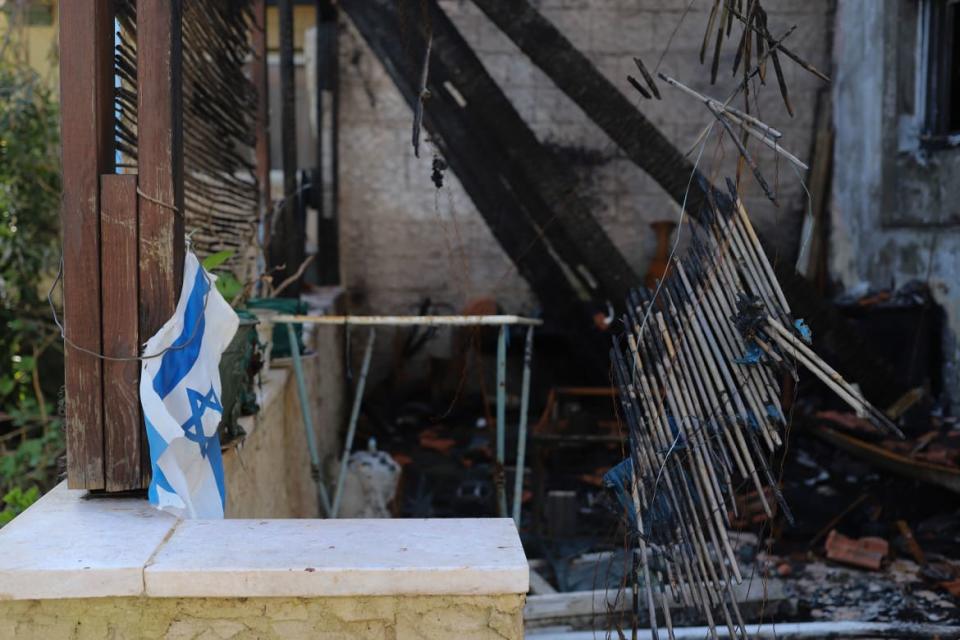Official Says Israel Must ‘Strike First’ in ‘Inevitable’ War in Second Country

KIRYAT SHMONA, Israel—“War is inevitable,” Avichai Stern told The Daily Beast, as artillery and rocket fire cracked around us, “If it is only a question of time then making a pre-emptive attack is a better idea than being sitting ducks here.” Dressed in a smart suit and rimmed glasses, the mayor of border city Kiryat Schmona sticks out among the Israeli Defense Forces soldiers in their combat fatigues, toting their machine guns. But they are all agreed on the fight ahead of them. “We are just waiting here for the big war to start,” said Aidan, an IDF soldier originally from the town.
Signs of war are everywhere. Driving to the city, we saw large numbers of Israeli artillery pieces being transported on the back of transport carriers towards the frontlines. Fighter jets flew back and forth overhead, presumably coming from bombing runs towards Gaza or northern Lebanon.
Just a few miles over the border are the fighters of the fearsome Iran-backed militia Hezbollah, their command posts and missile launch sites entrenched in southern Lebanon. Despite being designated as a terrorist organization by the U.S., U.K. and even the Arab League, the militia holds enormous power in Lebanese politics and is considered the world’s most heavily armed non-state actor.

Mayor of Kiryat Shmona Avichai Stern.
After Hamas militants killed nearly 1,200 Israelis on Oct. 7, 2023, and Israel began its retaliatory campaign that has killed 28,000 Palestinians in Gaza, a smaller scale conflict started here, with both the IDF and Hezbollah firing sporadically across the border. Around 200 Hezbollah fighters have been killed, along with at least 30 Lebanese civilians and three journalists. On the Israeli side, 12 IDF soldiers have fallen and seven civilians have been killed.
Our interview with the mayor was temporarily delayed when a siren rang out, announcing the presence of incoming rocket fire. Even hearing one of these is lucky, explains Ofri Moyal, a 24-year-old who was evacuated from Schlomi, another border town. “Many of the bombs there, they don’t hear any alarms or sirens because it is too close,” he told The Daily Beast in an interview from the hotel where his family is staying in Jerusalem. “That is why we can’t go home, they have no idea when it is about to hit their houses, there is no siren.” Of Kiryat Shmona’s original population of around 23,000, around 1,000 or so remain.

“Israel fires in one direction, Hezbollah fires in the other. Civilians are stuck in the middle,” he said.
The danger has forced both countries to evacuate tens of thousands of their civilians from the border regions, turning them into what one soldier described as a “free-fire” zone for both sides.
Stern evacuated on Oct. 16, when Hezbollah rockets started landing near his house. Since then, he and his family have been living in a hotel in Jerusalem. Around 96,000 people have been evacuated from the Israeli side of the border. For many, it is their second time. Moyal remembers when he was 7 years old, he and his family were forced to move to tents in southern Israel, after war broke out between Hezbollah and Lebanon in 2006.
Bombing the Last Refuge: Israel Makes It Impossible to Safely Follow Their Orders in Gaza
Yet it is the prospect of a full-scale war here that keeps Israeli and American military planners up at night.
Standing outside his office in the city center, now transformed into a military-style command bunker, Stern shows us a video produced by a Hezbollah propaganda channel that shows a plan for a Hezbollah strike on northern Israel. First, thousands of rockets will be fired from hidden launch facilities. Then, thousands of seasoned troops would swarm down and capture towns such as Schlomi, Metulla and Kiryat Schmona, taking hostages and human shields among the civilian population to dissuade further Israeli strikes on their positions.
Before Oct. 7, plans like these were treated as empty bluster—now they are taken deadly seriously. In a 34-day war in 2006, Hezbollah fought the IDF to a standstill on the ground, denting the perception of military superiority Israel had enjoyed over its Arab neighbors ever since the first war in 1948.
Israelis speak of Hamas with contempt and disgust. They speak of Hezbollah with fear and grudging respect. “Hezbollah is not just a terrorist group,” Stern says, “they are a great powerful military, their troops fought in Syria in the last six years, they are well trained and ready for war.”
A report by Reichman University’s Institute for Counter-Terrorism from before Oct. 7 recently detailed the lack of preparation in Israel for the realities of all-out war with Hezbollah.
It said, “Beyond causing immense destruction in Israel, including thousands of casualties on both the frontlines and the home front, causing public panic, a central objective of the multi-front attack will be to collapse the IDF’s air defense systems. Precision-guided munitions and low-signature weapons, such as loitering munitions, drones, and standoff missiles, will attempt to physically strike and destroy Iron Dome batteries.”
“It was a miracle they didn’t co-ordinate their assaults on Oct. 7,” said one local IDF security official. “Or we simply wouldn’t have been able to stop them”.

Ofri Moyal
“Since 2006,” Stern says, “Hezbollah took their time to buy ammunition. To increase their Radwan unit from 5,000 to 10,000 Increase their missile from 1,000 a day to 4,000 a day. It isn’t legitimate we won’t let the people of Kiryat Schmona be killed… an evil force like Hezbollah they have to be eliminated.”
He goes on to elaborate a controversial equation that critics say is the IDF’s strategy not just in Lebanon, but in Gaza. “We must create an equation that anyone who threatens Israel will be hit much more… they must be threatened by us… everyone in the Middle East who has bad intentions for Israel must be taught a lesson.”
This is the unofficial strategy elaborated by a former IDF commander, Gadi Eisenkot, in 2008 called the “Dahiya doctrine,” named after a suburb in Beirut that was a Hezbollah hub before it was annihilated by Israeli airstrikes in the 2006 retaliation. The doctrine specifically calls for overwhelming force to be used as a response to attacks on Israel in order to deter the enemy from ever attacking again. As he put it: “We will wield disproportionate power against every village from which shots are fired on Israel, and cause immense damage and destruction.”
Israel’s critics believe that this doctrine is at the heart of its tactics in the current war in Gaza, where it has leveled major population centers with huge civilian casualties. Stern agrees that Beirut would be a major target in a wider war. “We would not hesitate to strike at the heart of Lebanon,” Stern said.
For Israeli officials, this is necessary to deter wider threats emanating from Iran and its proxy network in the region. “Understand that everything is about Iran. Hezbollah and Hamas are proxies of Iran and this is why they have the same ideology and are capable of the same atrocities,” Stern said.
Hezbollah chiefs have expressed equal confidence in their supposedly inevitable victory. In a speech in early November, Hezbollah’s Secretary-General Hassan Nasrallah said, “Israel has revealed itself to be a weak state, as fragile as a spider web,” and promised to fight until Israel’s destruction.
Get the Daily Beast's biggest scoops and scandals delivered right to your inbox. Sign up now.
Stay informed and gain unlimited access to the Daily Beast's unmatched reporting. Subscribe now.


